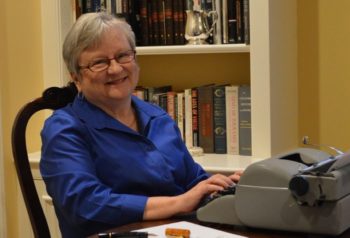
Ms. Sara Anderson
Fort Valley United Methodist Church, Fort Valley, GA
Shortly after the United Methodist Church’s General Conference ended, a blog appeared on my Twitter feed called “Why I’m No Longer a United Methodist,” by Collin Hansen writing for The Gospel Coalition.
The article was disheartening because I have heard many stories of people who left the church because of liberal teachings, progressive pastors or lack of a faithful witness in the local community. During my time of working with Campus Crusade for Christ (now known as Cru), I met countless young adults who did not find Christ in their local mainline churches, were converted in college and continued to attend non-denominational churches or more conservative denominations they found through parachurch campus ministries.
I cannot argue with their decisions. My story is different, yet not exceptional. I grew up in a small then-Methodist church in rural North Dakota, giving my life to Christ at a Methodist youth camp when I was 13. I attended catechism classes taught by a wonderful evangelical pastor and was confirmed. Small churches in my conference were fortunate. They often received pastors who were more theologically conservative. The liberal pastors were sent to larger churches. I suspect this was true in much of rural America.
When I was 16 the other youth in our group graduated from high school or dropped out. So I started teaching the 4 and 5-year old Sunday school class. I helped out in the kitchen during church and enjoyed being seen as a responsible member of the congregation.
Something was still missing in my life, and I responded to a call to deeper commitment to Christ during a United Methodist Lay Witness Mission held at our church. This led me to get involved with Campus Crusade at the University of North Dakota.
During my high school years I became more than a bit cynical about my denomination. My mother had never been happy with the “official” Sunday school material, and she encouraged the church to use more evangelical resources. My parents were also taken aback when charismatic and left-leaning James Armstrong became our bishop (later head of the National Council of Churches whose ordination was withdrawn by his Indiana conference for unnamed indiscretions.) In addition, United Methodist Women’s resources kept getting stranger and stranger.
When I joined Campus Crusade as a staff member in Southern California, I decided to part ways with the UMC. The church I chose to attend was Wesleyan in theology. It didn’t have official membership rolls, so I did not make an official break from the UMC. Still, after a joyful and productive year with that congregation, I felt God was directing me back to my roots. The thought of finding an evangelical UM church in Southern California seemed impossible. Out of four UM churches in San Bernardino, the first I visited was a former Evangelical United Brethren church (they merged with the Methodists in 1968 to become the UMC).
Trinity was an aging congregation with vibrant faith that welcomed Campus Crusade staff to participate in all levels of church life. I served on the then Administrative Council, taught adult Sunday school classes, served as liturgist and enjoyed the Sunday school parties (participants ranged in age from 22 to 89) and other social functions. When I arrived the church had a part-time appointment, but attendance grew to be able to support a full-time pastor. Our evangelical pastor, who had some difficulties being ordained because he’d attended Fuller Theological Seminary, an orthodox multi-denominational seminary, served the church well.
My church memberships in Kentucky and Indiana were comparable, although I did have my first experience with a progressive pastor. I won’t go into great detail, but his appointment did great damage to that church. One parishioner asked the pastor if he believed that Jesus was the only way to God. The pastor responded, “Christians believe that.” The poor man was too stunned to repeat the question in hopes of hearing a personal answer. Our only Hispanic family left after our pastor criticized U.S. foreign policy in Latin America. I finally moved on after he, in a pastoral prayer, thanked God for the new (Democratic-majority) House of Representatives and for all the people who would now have access to housing, health care and enough to eat.
Fortunately, UM churches are abundant in Indiana, and I transferred my membership to another church 10 miles away with evangelical leadership. Now living in Georgia, I attend a theologically strong church. Like in many UM congregations, our people are aging, but participate in the life of the church. Our pastor, appointed a year ago has vision of church growth through spiritual maturity and community involvement.
While I understand the struggles many evangelicals have experienced in a denomination mostly led by theological progressives, many UMC congregations provide opportunities for folks to grow in their faith and serve others.
As a single woman with a limited extended family who has moved across the country, the congregations in all these states have welcomed me, allowed me to become a part of the church community and given me opportunities for leadership. These United Methodist believers have enabled me to live a life faithful to God in the UMC.
About